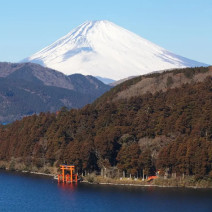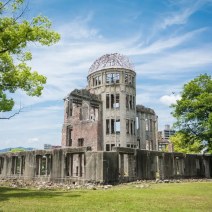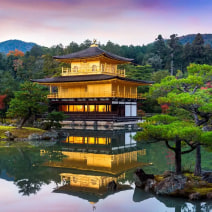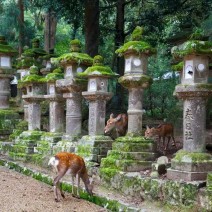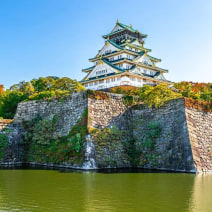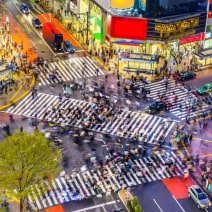Japan Travel Guide
The "Land of the Rising Sun" is a captivating destination where futuristic cities seamlessly blend with ancient traditions and sights. Exploring Japan is an exciting and enriching experience where you can uncover the country's beautiful landscapes, historical sights, fascinating culture and encounter 'omotenashi' - Japanese hospitality.
Japan is a sovereign island nation located in the Pacific Ocean, it lies off the eastern coast of the Asian mainland. The country has a population of 127 million people and approximately 9.1 million people live in Tokyo, the capital of the country. The two major religions in Japan are Shintoism and Buddhism, both have influenced cultural values, especially the importance of social rituals, which can be seen in Japanese tea ceremonies and ikebana.
The modern and traditional blend is unique in Japan. Visit ancient temples and shrines, such as Kinkaku-ji and shrines Fushimi Inari in Kyoto, take the high speed bullet train, be captivated by the neon lights and skyscrapers in Tokyo or Osaka or enjoy the tranquillity of Nara Park and scenic beauty of Lake Ashi where on a clear day you can admire Mount Fuji.
We've outlined some general information that may be helpful to you when planning your next holiday to Japan.

Time Zone & Currency
The entire country is in the same time zone and is nine hours ahead of Greenwich Mean Time (GMT). The currency in Japan is the yen.

Weather in Japan
Japan experiences four distinct seasons, mild in the Spring and famous for cherry blossoms, hot and humid summers, cooler Autumns and cold winters.

Reading For Your Trip To Japan
Memoirs of a Geisha by Arthur Golden
Norwegian Wood by Haruki Murakami
A Pale View of Hills by Kazou Ishiguro
Best time to go to Japan
March to May (Spring) and September to November (Autumn) are the best months to visit Japan as they are usually dry months with pleasant weather. Spring is the season of the famous cherry blossoms trees or 'Sakura' and in the Autumn you can experience 'Momiji-gari' and see the colourful foliage.
Top Tourist Attractions In Japan
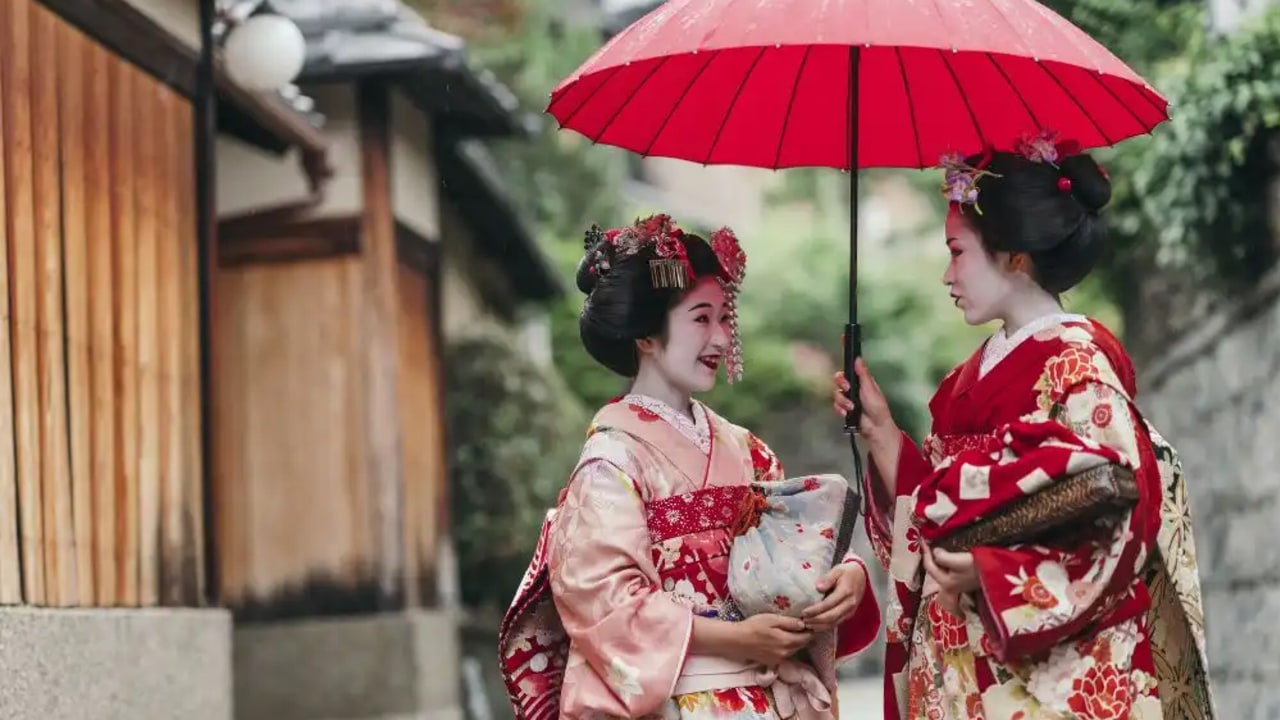
10 interesting facts about Japan
A worldwide icon and symbol of Japanese culture, Geisha are traditional female entertainers who are skilled in Japanese art, music and dance. There used to be around 80,000 geisha in Japan, but today it's around 1,000 and they are mainly found in Kyoto.

Virtual Tour of Japan
Our expert guide Frances MacDonald takes us on a virtual tour to discover the 'Land of the Rising Sun' and its serene gardens.
Food and drink in Japan
apanese cuisine is celebrated worldwide, and it’s rare to visit a major city without finding sushi restaurants or noodle bars. However, the authenticity of Japanese food in its home country is an experience like no other. Some must-try dishes include:
- Sushi and Sashimi: Freshly prepared fish or seafood, often paired with rice and served with soy sauce, wasabi, and pickled ginger.
- Ramen: A beloved noodle soup dish with a rich broth, topped with ingredients like sliced pork, eggs, and seaweed.
- Tempura: Lightly battered and deep-fried vegetables or seafood, served with a delicate dipping sauce.
- Miso Soup: A traditional soup made with fermented soybean paste, tofu, seaweed, and green onions, often enjoyed as a starter.
- Saké: A Japanese rice wine that pairs wonderfully with the country’s cuisine.
Japanese food is both healthy and flavourful, with dishes centred around rice, fish, vegetables, and miso. For those seeking more familiar flavours, there are also Western-style options available in many areas.
Japan Travel Guide FAQs
Can you give a brief history of Japan?
The first inhabitants to Japan can be traced all the way back to prehistoric times; the Yayoi period (300 BC - 250AD) saw the introduction of rice farming and metal work. Buddhism was introduced to Japan from China and Korea in the 6th century during the Kofun period, which also saw the rise of powerful clans like the Yamato who established the Imperial House or royal family of Japan. The Nara Period (710 - 794) saw the establishment of a centralized imperial government and creation of the first permanent capital in Nara, which was later changed to modern day Kyoto during the Heian period (794 - 1185). The feudal era began with the rise of the samurai warriors in the 12th century and lasted until the early 1600s. The Edo Period then followed and under the rule of the Tokugawa shogunate there was very restricted contact outside of Japan, but during this time the country saw cultural development in art, poetry and theatre. After 100s of years of isolation, the Meiji Restoration (1868 -1912) saw the modernisation of Japan's government, economy and military. Japan's involvement in WW2 ultimately led to the infamous atomic bombings of Nagasaki and Hiroshima. After they surrendered, Japan adopted a new constitution in 1947, which is still adhered to this day. From the 1950s until the 1980s saw the 'Japanese economic miracle', where its car, electronics, computer industries grew and helped established Japan to be one of the most powerful and developed countries in the world as we know it today.
Do I need a holiday visa for Japan?
Irish and British passport holders: Your passport should be valid for minimum six months from your return date of travel and you must also have an onward/return ticket to substantiate you plan to leave the country within a 90 day period. If these requirements are met you will be able to enter upon arrival. Non Irish / British passport holders should check their visa requirements with the relevant Embassy or Consulate.
Is Japan safe?
Japan is the safest country in the world. However, in any large city there can be opportunists and pickpockets. It is wise to be vigilant, especially at busy tourist attractions, and always take good care of your personal belongings.
Is English widely spoken in Japan?
Do not expect to be able to read any Japanese although English is creeping in on many signs particularly on the trains and underground in major cities. All young people learn English and if you need to approach anyone to find you way or have something explained, they will be more than happy to help. Try to learn some basic Japanese phrases as the locals will appreciate you trying to make an effort to speak their language!
What’s the etiquette for tipping in Japan?
In general tipping in Japan is not customary and can often be viewed as an insult. Respect and politeness is expected at all times and travellers are cautioned not to be offended if your tip is rejected. However if you have the services of a guide, a tip is most welcome and must always be given in an envelope.
What should I pack for my trip to Japan?
Try to travel as light as possible. ‘Smart casual’ clothing is probably the most advisable – the Japanese are extremely smart and fashion conscious but don’t attempt to compete! Everything is available there but clothes, particularly shoes, are smaller sizes. Do wear comfortable shoes, as we will be doing a lot of walking. Some of the temples require visitors to remove their footwear. If you do wear sandals, bring socks – bare feet are not acceptable.
What are the plug sockets in Japan?
In Japan the power sockets are of type A and B, these are the two prong and three prong outputs respectively. The standard voltage is 100 V and the standard frequency is 50/60 Hz. To avoid any issues upon arrival we always recommend travelling with a universal adapter as this will be able to work in any country you visit.
Useful Links
- For up-to-date information regarding entry into Japan please see: www.dfa.ie
- Official Japan Tourism Board: japan.travel
